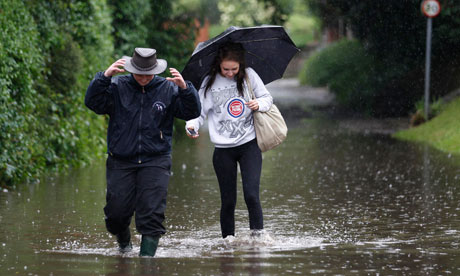
People wade through flood water at Barnham near Chichester in southern England. Photograph: Luke Macgregor/Reuters
Householders and business owners are being warned about flashflooding in someparts of England as hundreds of people continued to mop up following the recent deluge.
The number of flood warnings, which signal that flooding is expected and ordering people to take immediate action, rose to five overnight. All of the warnings concernedriverside areas in south-east England, including the River Ouzel in Bedfordshire.
More than 40 flood alerts – which mean that flooding is possible – were issued by the Environment Agency, again mainly for the south-east but also for East Anglia, the Midlands, the north-east and south-west.
Up to 65mm of rain has fallen within 24 hours, more than southern England's average rainfall for the whole of June, flooding homes and businesses, closing schools and disrupting transport.
On Tuesday morning, four schools in West Sussex, which bore the brunt of the bad weather in England, were closed. A number of A-roads were closed and two lanes of the M3 were shut.
A severe weather warning issued by the Met Office for London, the south-east, east and south-west of England and Wales remained in force.There is no end in sight to the bad weather in some parts of the country, with another area of low pressure bringing in more rainclouds expected later in the week.
Though forecasters were not expecting torrential rain immediately, the fear is that even light rain on saturated ground could cause problems.
The clear-up continued in areas such as Littlehampton, on the Sussex coast, where about 40 properties, including holiday B&Bs, were under as much as 1.2 metres (4ft) of water.
Emergency services warned people to stay away from floodwater and not to attempt to drive through it. Health officials said people who swallowed floodwater should seek medical help if they felt ill. One other side-effect of the weather has been an increase in the number of rats leaving flooded sewers.
In Wales, scientists are investigating if the flooding has washed downstream potentially harmful metals such as zinc and lead.
More than 1,500 people were evacuated and 150 rescued after water gushed through homes and businesses in Ceredigion, Powys and Gwynedd, where as much as 150mm of water fell within 24 hours – twice the average for the whole of June. Ceredigion county council leader, Ellen ap Gwynn, said many people who had lost everything were not insured. She said: "It has been a once-in-a-100-year event. I think now the full scale of the damage and loss is beginning to sink in." The council is setting up a disaster fund for those not insured. "I would urge the public to donate everything they can to help those who have lost everything," she said.
The Welsh first minister, Carwyn Jones, said the government was spending £40m on bolstering flood defences and tackling coastal erosion over the next 12 months. "The reality is you can't prevent flooding at all times, especially when you get very unusual weather patterns such as we've seen over the last few days in this part of Wales," he said.
"The situation will be examined; we'll talk to the Environment Agency about what could be done to help boost flood defences in the future."
The leader of the Welsh Conservatives, Andrew RT Davies, said lessons had to be learned. "While we all hope this will be a once in a lifetime event for these particular communities, similar disasters have become increasingly common and it is incumbent upon the government to take steps to alleviate the causes.
"It is also timely for ministers to look very closely at development on land prone to flooding and consider the introduction of policy to put an end to this practice."
Despite the heavy rain, the Environment Agency confirmed areas of southern England still remained in drought, although it said the crisis was easing.
A spokesman said: "The rain we have had since the start of April following the driest March for 70 years has led to a huge improvement in water resources. Water companies have seen reservoir levels rise, river levels are mostly back to normal and many wildlife habitats that were suffering due to a lack of water have recovered."

No comments:
Post a Comment